Christian Spirituality: Prayer's History and Modern Relevance Essay
VerifiedAdded on 2023/04/22
|7
|1531
|405
Essay
AI Summary
This essay explores the relationship between historical understandings of prayer and contemporary practices. The author agrees that a deep understanding of prayer's historical context, including its origins in the Garden of Eden and its evolution through Christian spirituality, enhances modern practices. The essay supports its argument by referencing various journal articles, books, and quotes from lectures and historical figures like Augustine, Bernard of Clairvaux, and Evelyn Underhill. It discusses the nature of prayer as communication with God, its role in social justice, and the impact of globalization on spirituality. The essay concludes that understanding the history of prayer is crucial for appreciating its diverse forms and relevance in addressing contemporary challenges, promoting ethical behavior, and fostering spiritual growth. The importance of prayer in solving problems, bringing people closer to God, and inspiring hope is also highlighted.

Sociology
Sociology
Name
Institution
Professor
Course
Date
1
Sociology
Name
Institution
Professor
Course
Date
1
Paraphrase This Document
Need a fresh take? Get an instant paraphrase of this document with our AI Paraphraser
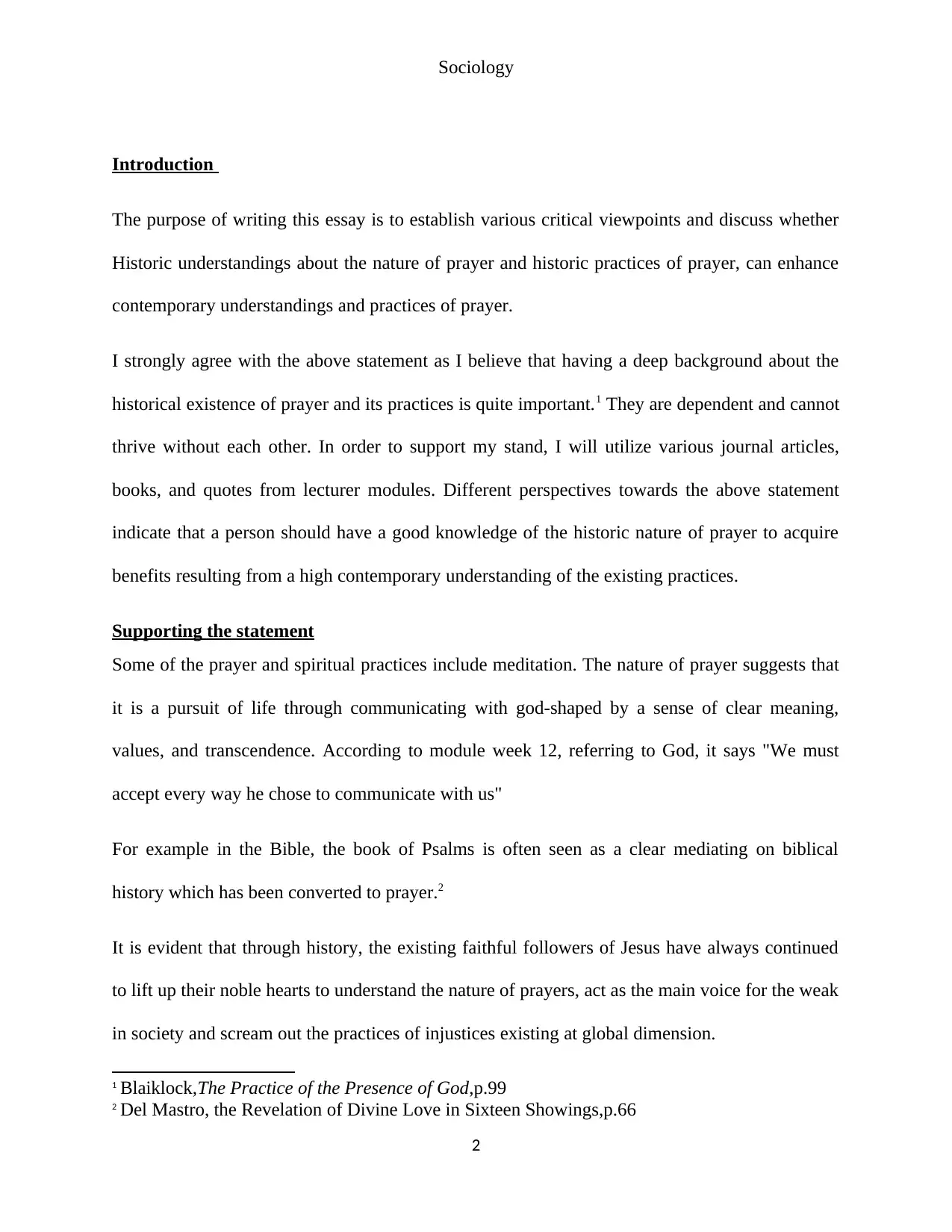
Sociology
Introduction
The purpose of writing this essay is to establish various critical viewpoints and discuss whether
Historic understandings about the nature of prayer and historic practices of prayer, can enhance
contemporary understandings and practices of prayer.
I strongly agree with the above statement as I believe that having a deep background about the
historical existence of prayer and its practices is quite important.1 They are dependent and cannot
thrive without each other. In order to support my stand, I will utilize various journal articles,
books, and quotes from lecturer modules. Different perspectives towards the above statement
indicate that a person should have a good knowledge of the historic nature of prayer to acquire
benefits resulting from a high contemporary understanding of the existing practices.
Supporting the statement
Some of the prayer and spiritual practices include meditation. The nature of prayer suggests that
it is a pursuit of life through communicating with god-shaped by a sense of clear meaning,
values, and transcendence. According to module week 12, referring to God, it says "We must
accept every way he chose to communicate with us"
For example in the Bible, the book of Psalms is often seen as a clear mediating on biblical
history which has been converted to prayer.2
It is evident that through history, the existing faithful followers of Jesus have always continued
to lift up their noble hearts to understand the nature of prayers, act as the main voice for the weak
in society and scream out the practices of injustices existing at global dimension.
1 Blaiklock,The Practice of the Presence of God,p.99
2 Del Mastro, the Revelation of Divine Love in Sixteen Showings,p.66
2
Introduction
The purpose of writing this essay is to establish various critical viewpoints and discuss whether
Historic understandings about the nature of prayer and historic practices of prayer, can enhance
contemporary understandings and practices of prayer.
I strongly agree with the above statement as I believe that having a deep background about the
historical existence of prayer and its practices is quite important.1 They are dependent and cannot
thrive without each other. In order to support my stand, I will utilize various journal articles,
books, and quotes from lecturer modules. Different perspectives towards the above statement
indicate that a person should have a good knowledge of the historic nature of prayer to acquire
benefits resulting from a high contemporary understanding of the existing practices.
Supporting the statement
Some of the prayer and spiritual practices include meditation. The nature of prayer suggests that
it is a pursuit of life through communicating with god-shaped by a sense of clear meaning,
values, and transcendence. According to module week 12, referring to God, it says "We must
accept every way he chose to communicate with us"
For example in the Bible, the book of Psalms is often seen as a clear mediating on biblical
history which has been converted to prayer.2
It is evident that through history, the existing faithful followers of Jesus have always continued
to lift up their noble hearts to understand the nature of prayers, act as the main voice for the weak
in society and scream out the practices of injustices existing at global dimension.
1 Blaiklock,The Practice of the Presence of God,p.99
2 Del Mastro, the Revelation of Divine Love in Sixteen Showings,p.66
2
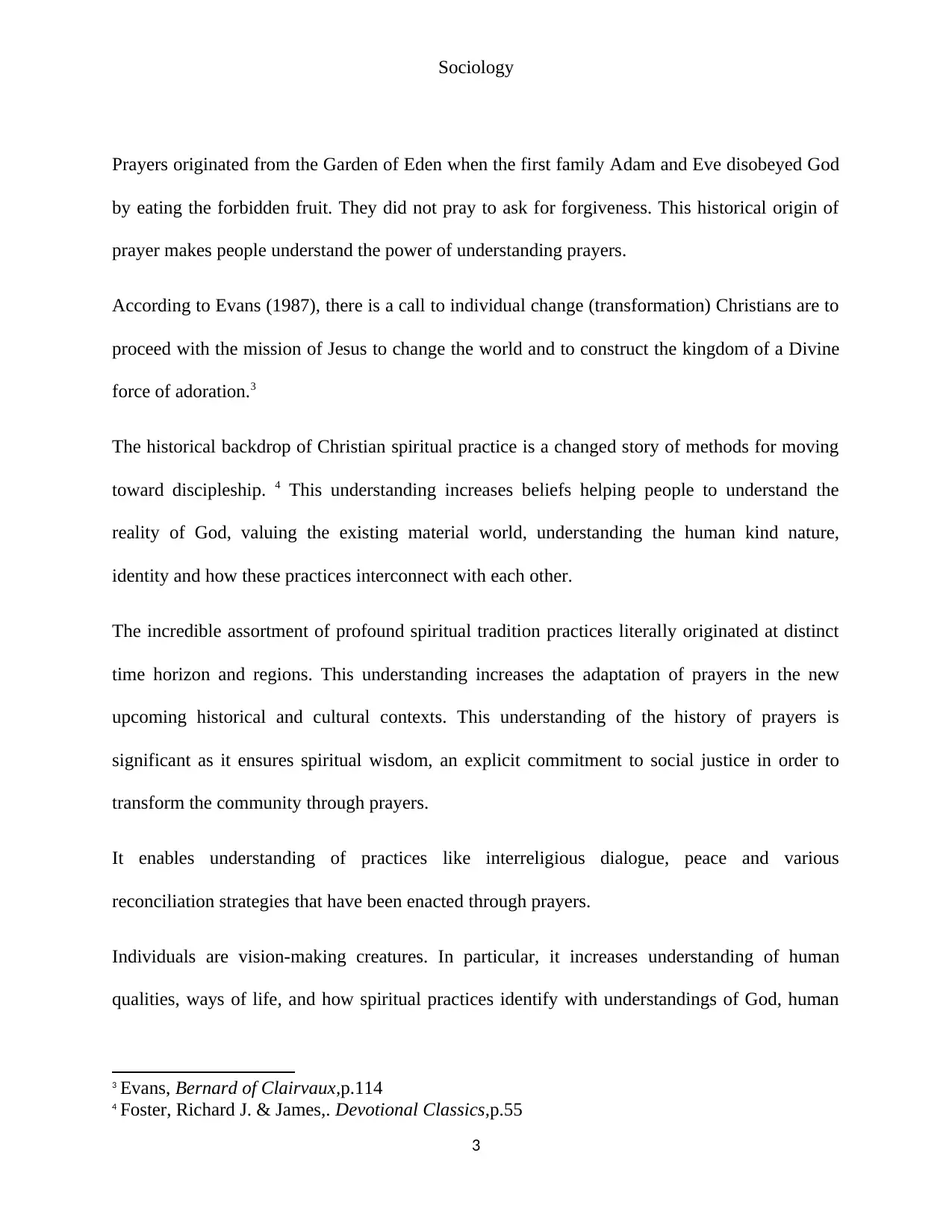
Sociology
Prayers originated from the Garden of Eden when the first family Adam and Eve disobeyed God
by eating the forbidden fruit. They did not pray to ask for forgiveness. This historical origin of
prayer makes people understand the power of understanding prayers.
According to Evans (1987), there is a call to individual change (transformation) Christians are to
proceed with the mission of Jesus to change the world and to construct the kingdom of a Divine
force of adoration.3
The historical backdrop of Christian spiritual practice is a changed story of methods for moving
toward discipleship. 4 This understanding increases beliefs helping people to understand the
reality of God, valuing the existing material world, understanding the human kind nature,
identity and how these practices interconnect with each other.
The incredible assortment of profound spiritual tradition practices literally originated at distinct
time horizon and regions. This understanding increases the adaptation of prayers in the new
upcoming historical and cultural contexts. This understanding of the history of prayers is
significant as it ensures spiritual wisdom, an explicit commitment to social justice in order to
transform the community through prayers.
It enables understanding of practices like interreligious dialogue, peace and various
reconciliation strategies that have been enacted through prayers.
Individuals are vision-making creatures. In particular, it increases understanding of human
qualities, ways of life, and how spiritual practices identify with understandings of God, human
3 Evans, Bernard of Clairvaux,p.114
4 Foster, Richard J. & James,. Devotional Classics,p.55
3
Prayers originated from the Garden of Eden when the first family Adam and Eve disobeyed God
by eating the forbidden fruit. They did not pray to ask for forgiveness. This historical origin of
prayer makes people understand the power of understanding prayers.
According to Evans (1987), there is a call to individual change (transformation) Christians are to
proceed with the mission of Jesus to change the world and to construct the kingdom of a Divine
force of adoration.3
The historical backdrop of Christian spiritual practice is a changed story of methods for moving
toward discipleship. 4 This understanding increases beliefs helping people to understand the
reality of God, valuing the existing material world, understanding the human kind nature,
identity and how these practices interconnect with each other.
The incredible assortment of profound spiritual tradition practices literally originated at distinct
time horizon and regions. This understanding increases the adaptation of prayers in the new
upcoming historical and cultural contexts. This understanding of the history of prayers is
significant as it ensures spiritual wisdom, an explicit commitment to social justice in order to
transform the community through prayers.
It enables understanding of practices like interreligious dialogue, peace and various
reconciliation strategies that have been enacted through prayers.
Individuals are vision-making creatures. In particular, it increases understanding of human
qualities, ways of life, and how spiritual practices identify with understandings of God, human
3 Evans, Bernard of Clairvaux,p.114
4 Foster, Richard J. & James,. Devotional Classics,p.55
3
⊘ This is a preview!⊘
Do you want full access?
Subscribe today to unlock all pages.

Trusted by 1+ million students worldwide
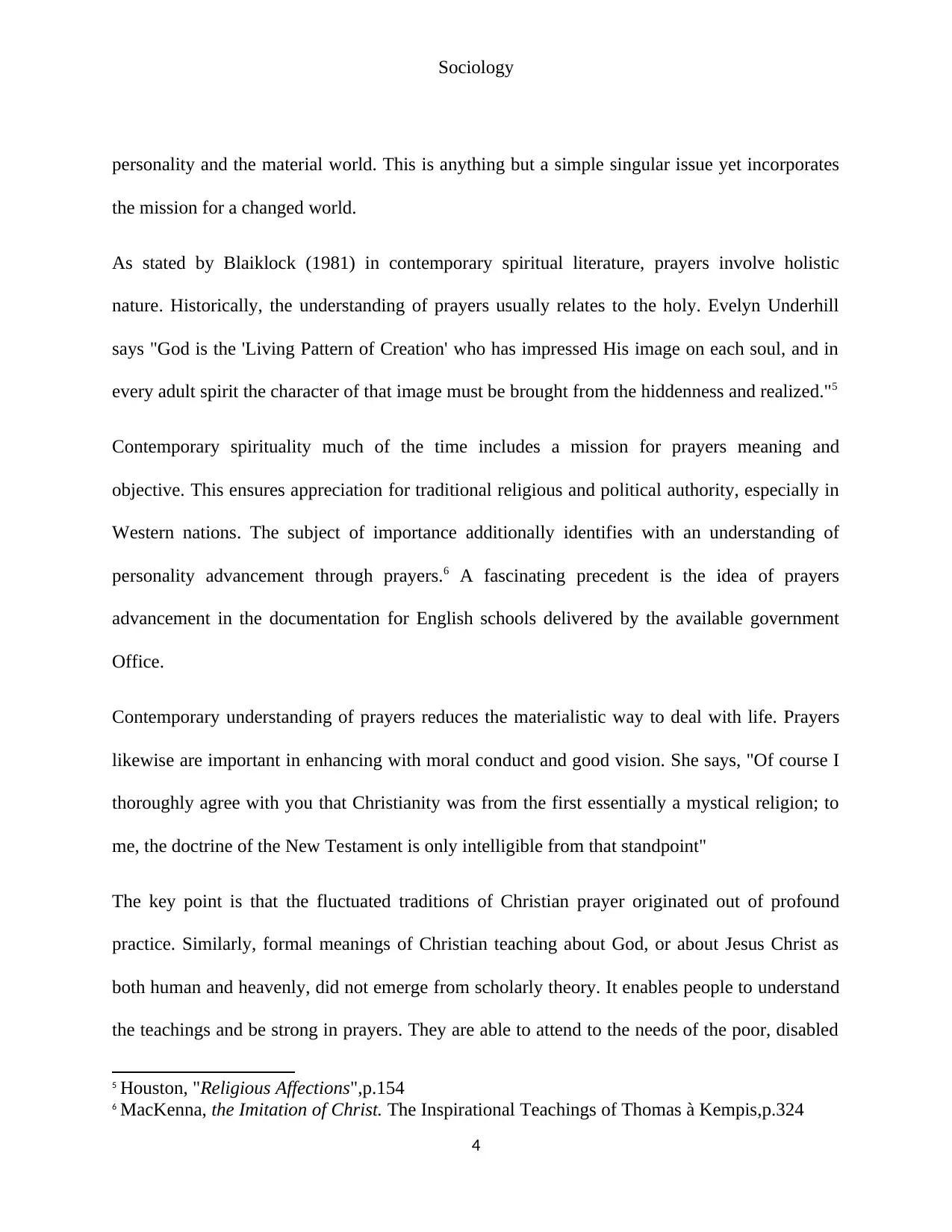
Sociology
personality and the material world. This is anything but a simple singular issue yet incorporates
the mission for a changed world.
As stated by Blaiklock (1981) in contemporary spiritual literature, prayers involve holistic
nature. Historically, the understanding of prayers usually relates to the holy. Evelyn Underhill
says "God is the 'Living Pattern of Creation' who has impressed His image on each soul, and in
every adult spirit the character of that image must be brought from the hiddenness and realized."5
Contemporary spirituality much of the time includes a mission for prayers meaning and
objective. This ensures appreciation for traditional religious and political authority, especially in
Western nations. The subject of importance additionally identifies with an understanding of
personality advancement through prayers.6 A fascinating precedent is the idea of prayers
advancement in the documentation for English schools delivered by the available government
Office.
Contemporary understanding of prayers reduces the materialistic way to deal with life. Prayers
likewise are important in enhancing with moral conduct and good vision. She says, "Of course I
thoroughly agree with you that Christianity was from the first essentially a mystical religion; to
me, the doctrine of the New Testament is only intelligible from that standpoint"
The key point is that the fluctuated traditions of Christian prayer originated out of profound
practice. Similarly, formal meanings of Christian teaching about God, or about Jesus Christ as
both human and heavenly, did not emerge from scholarly theory. It enables people to understand
the teachings and be strong in prayers. They are able to attend to the needs of the poor, disabled
5 Houston, "Religious Affections",p.154
6 MacKenna, the Imitation of Christ. The Inspirational Teachings of Thomas à Kempis,p.324
4
personality and the material world. This is anything but a simple singular issue yet incorporates
the mission for a changed world.
As stated by Blaiklock (1981) in contemporary spiritual literature, prayers involve holistic
nature. Historically, the understanding of prayers usually relates to the holy. Evelyn Underhill
says "God is the 'Living Pattern of Creation' who has impressed His image on each soul, and in
every adult spirit the character of that image must be brought from the hiddenness and realized."5
Contemporary spirituality much of the time includes a mission for prayers meaning and
objective. This ensures appreciation for traditional religious and political authority, especially in
Western nations. The subject of importance additionally identifies with an understanding of
personality advancement through prayers.6 A fascinating precedent is the idea of prayers
advancement in the documentation for English schools delivered by the available government
Office.
Contemporary understanding of prayers reduces the materialistic way to deal with life. Prayers
likewise are important in enhancing with moral conduct and good vision. She says, "Of course I
thoroughly agree with you that Christianity was from the first essentially a mystical religion; to
me, the doctrine of the New Testament is only intelligible from that standpoint"
The key point is that the fluctuated traditions of Christian prayer originated out of profound
practice. Similarly, formal meanings of Christian teaching about God, or about Jesus Christ as
both human and heavenly, did not emerge from scholarly theory. It enables people to understand
the teachings and be strong in prayers. They are able to attend to the needs of the poor, disabled
5 Houston, "Religious Affections",p.154
6 MacKenna, the Imitation of Christ. The Inspirational Teachings of Thomas à Kempis,p.324
4
Paraphrase This Document
Need a fresh take? Get an instant paraphrase of this document with our AI Paraphraser
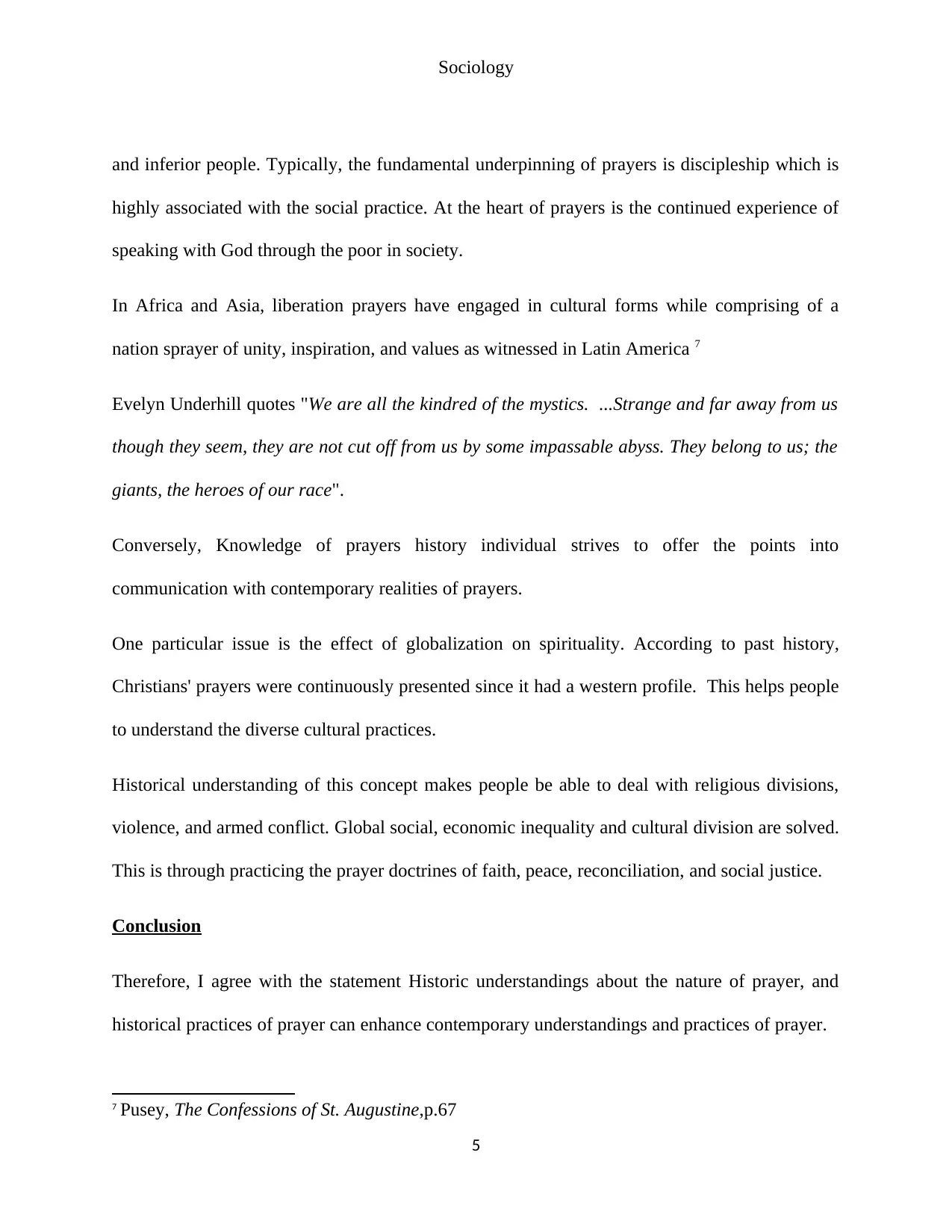
Sociology
and inferior people. Typically, the fundamental underpinning of prayers is discipleship which is
highly associated with the social practice. At the heart of prayers is the continued experience of
speaking with God through the poor in society.
In Africa and Asia, liberation prayers have engaged in cultural forms while comprising of a
nation sprayer of unity, inspiration, and values as witnessed in Latin America 7
Evelyn Underhill quotes "We are all the kindred of the mystics. ...Strange and far away from us
though they seem, they are not cut off from us by some impassable abyss. They belong to us; the
giants, the heroes of our race".
Conversely, Knowledge of prayers history individual strives to offer the points into
communication with contemporary realities of prayers.
One particular issue is the effect of globalization on spirituality. According to past history,
Christians' prayers were continuously presented since it had a western profile. This helps people
to understand the diverse cultural practices.
Historical understanding of this concept makes people be able to deal with religious divisions,
violence, and armed conflict. Global social, economic inequality and cultural division are solved.
This is through practicing the prayer doctrines of faith, peace, reconciliation, and social justice.
Conclusion
Therefore, I agree with the statement Historic understandings about the nature of prayer, and
historical practices of prayer can enhance contemporary understandings and practices of prayer.
7 Pusey, The Confessions of St. Augustine,p.67
5
and inferior people. Typically, the fundamental underpinning of prayers is discipleship which is
highly associated with the social practice. At the heart of prayers is the continued experience of
speaking with God through the poor in society.
In Africa and Asia, liberation prayers have engaged in cultural forms while comprising of a
nation sprayer of unity, inspiration, and values as witnessed in Latin America 7
Evelyn Underhill quotes "We are all the kindred of the mystics. ...Strange and far away from us
though they seem, they are not cut off from us by some impassable abyss. They belong to us; the
giants, the heroes of our race".
Conversely, Knowledge of prayers history individual strives to offer the points into
communication with contemporary realities of prayers.
One particular issue is the effect of globalization on spirituality. According to past history,
Christians' prayers were continuously presented since it had a western profile. This helps people
to understand the diverse cultural practices.
Historical understanding of this concept makes people be able to deal with religious divisions,
violence, and armed conflict. Global social, economic inequality and cultural division are solved.
This is through practicing the prayer doctrines of faith, peace, reconciliation, and social justice.
Conclusion
Therefore, I agree with the statement Historic understandings about the nature of prayer, and
historical practices of prayer can enhance contemporary understandings and practices of prayer.
7 Pusey, The Confessions of St. Augustine,p.67
5
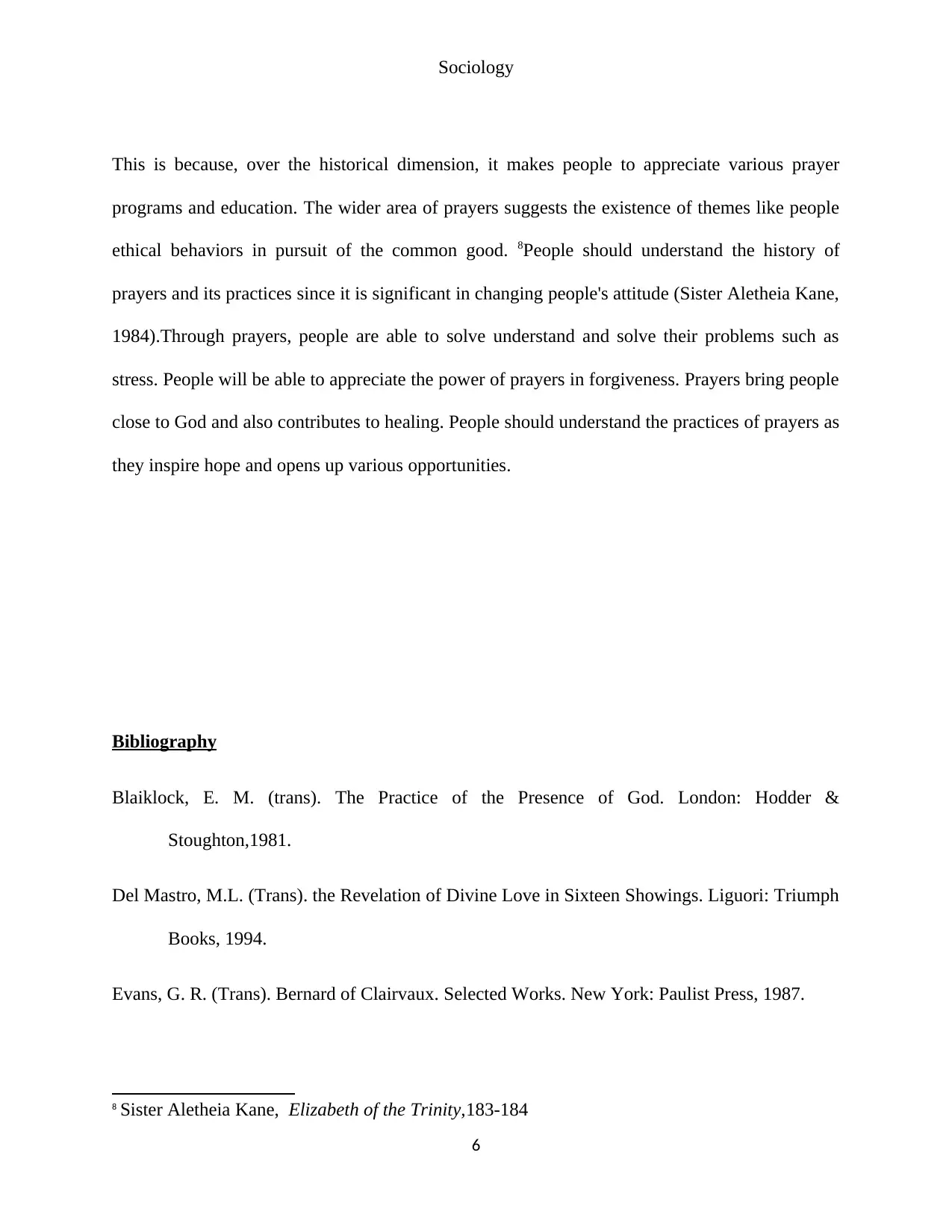
Sociology
This is because, over the historical dimension, it makes people to appreciate various prayer
programs and education. The wider area of prayers suggests the existence of themes like people
ethical behaviors in pursuit of the common good. 8People should understand the history of
prayers and its practices since it is significant in changing people's attitude (Sister Aletheia Kane,
1984).Through prayers, people are able to solve understand and solve their problems such as
stress. People will be able to appreciate the power of prayers in forgiveness. Prayers bring people
close to God and also contributes to healing. People should understand the practices of prayers as
they inspire hope and opens up various opportunities.
Bibliography
Blaiklock, E. M. (trans). The Practice of the Presence of God. London: Hodder &
Stoughton,1981.
Del Mastro, M.L. (Trans). the Revelation of Divine Love in Sixteen Showings. Liguori: Triumph
Books, 1994.
Evans, G. R. (Trans). Bernard of Clairvaux. Selected Works. New York: Paulist Press, 1987.
8 Sister Aletheia Kane, Elizabeth of the Trinity,183-184
6
This is because, over the historical dimension, it makes people to appreciate various prayer
programs and education. The wider area of prayers suggests the existence of themes like people
ethical behaviors in pursuit of the common good. 8People should understand the history of
prayers and its practices since it is significant in changing people's attitude (Sister Aletheia Kane,
1984).Through prayers, people are able to solve understand and solve their problems such as
stress. People will be able to appreciate the power of prayers in forgiveness. Prayers bring people
close to God and also contributes to healing. People should understand the practices of prayers as
they inspire hope and opens up various opportunities.
Bibliography
Blaiklock, E. M. (trans). The Practice of the Presence of God. London: Hodder &
Stoughton,1981.
Del Mastro, M.L. (Trans). the Revelation of Divine Love in Sixteen Showings. Liguori: Triumph
Books, 1994.
Evans, G. R. (Trans). Bernard of Clairvaux. Selected Works. New York: Paulist Press, 1987.
8 Sister Aletheia Kane, Elizabeth of the Trinity,183-184
6
⊘ This is a preview!⊘
Do you want full access?
Subscribe today to unlock all pages.

Trusted by 1+ million students worldwide
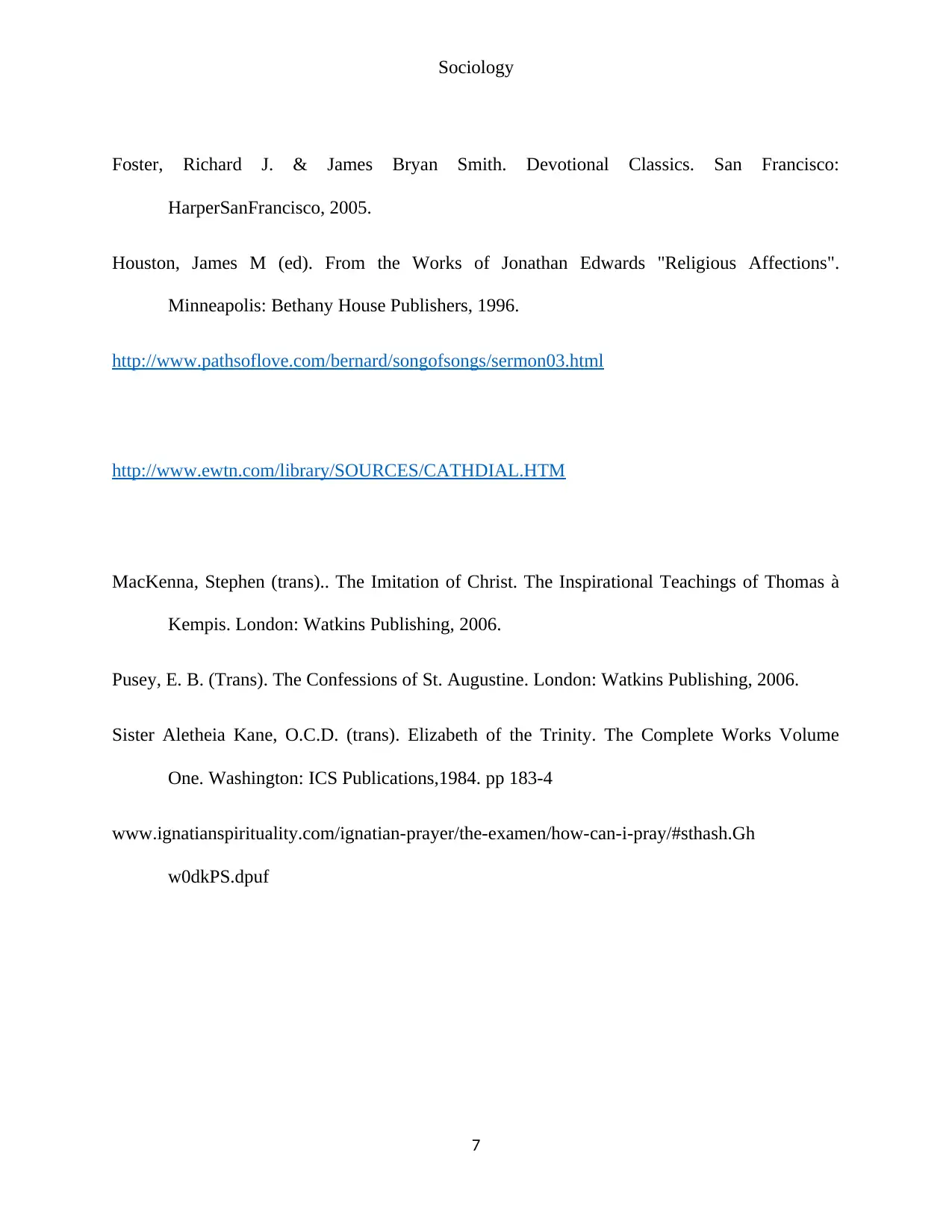
Sociology
Foster, Richard J. & James Bryan Smith. Devotional Classics. San Francisco:
HarperSanFrancisco, 2005.
Houston, James M (ed). From the Works of Jonathan Edwards "Religious Affections".
Minneapolis: Bethany House Publishers, 1996.
http://www.pathsoflove.com/bernard/songofsongs/sermon03.html
http://www.ewtn.com/library/SOURCES/CATHDIAL.HTM
MacKenna, Stephen (trans).. The Imitation of Christ. The Inspirational Teachings of Thomas à
Kempis. London: Watkins Publishing, 2006.
Pusey, E. B. (Trans). The Confessions of St. Augustine. London: Watkins Publishing, 2006.
Sister Aletheia Kane, O.C.D. (trans). Elizabeth of the Trinity. The Complete Works Volume
One. Washington: ICS Publications,1984. pp 183-4
www.ignatianspirituality.com/ignatian-prayer/the-examen/how-can-i-pray/#sthash.Gh
w0dkPS.dpuf
7
Foster, Richard J. & James Bryan Smith. Devotional Classics. San Francisco:
HarperSanFrancisco, 2005.
Houston, James M (ed). From the Works of Jonathan Edwards "Religious Affections".
Minneapolis: Bethany House Publishers, 1996.
http://www.pathsoflove.com/bernard/songofsongs/sermon03.html
http://www.ewtn.com/library/SOURCES/CATHDIAL.HTM
MacKenna, Stephen (trans).. The Imitation of Christ. The Inspirational Teachings of Thomas à
Kempis. London: Watkins Publishing, 2006.
Pusey, E. B. (Trans). The Confessions of St. Augustine. London: Watkins Publishing, 2006.
Sister Aletheia Kane, O.C.D. (trans). Elizabeth of the Trinity. The Complete Works Volume
One. Washington: ICS Publications,1984. pp 183-4
www.ignatianspirituality.com/ignatian-prayer/the-examen/how-can-i-pray/#sthash.Gh
w0dkPS.dpuf
7
1 out of 7
Related Documents
Your All-in-One AI-Powered Toolkit for Academic Success.
+13062052269
info@desklib.com
Available 24*7 on WhatsApp / Email
![[object Object]](/_next/static/media/star-bottom.7253800d.svg)
Unlock your academic potential
Copyright © 2020–2026 A2Z Services. All Rights Reserved. Developed and managed by ZUCOL.




